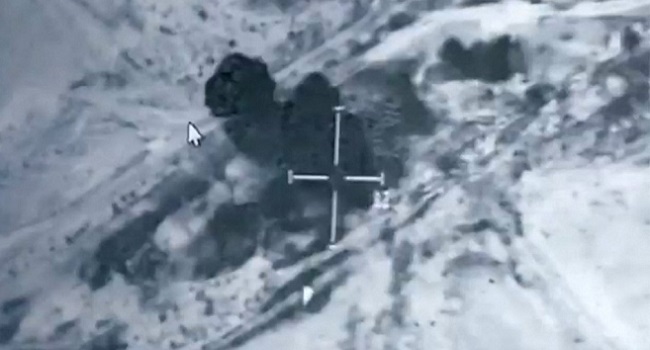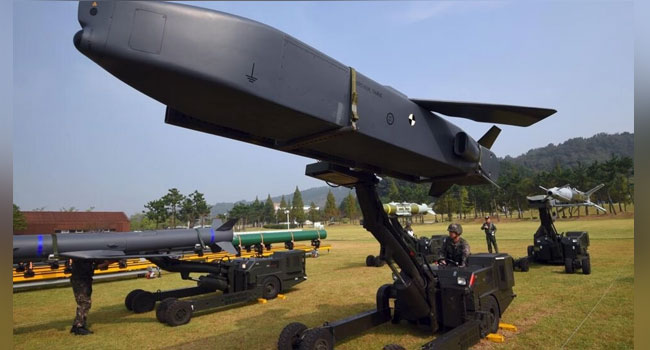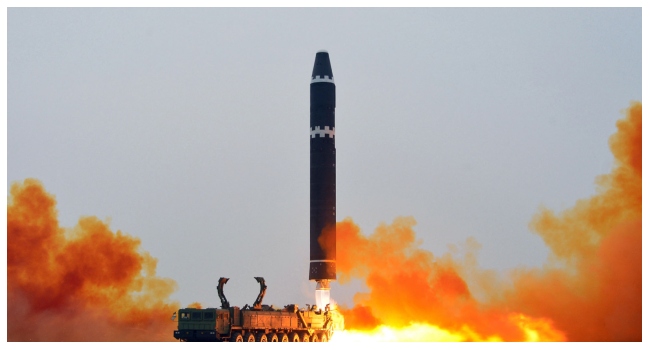
The United Arab Emirates shot down a ballistic missile fired by Yemen’s Huthi rebels during a visit by Israel’s president Monday, the latest attack to rattle the Middle East financial hub.
Nobody was hurt in the early-hours attack, the third in consecutive weeks on the wealthy Gulf nation that is part of the Saudi-led coalition fighting Yemen’s Iran-backed insurgents.
“Air defence forces… intercepted and destroyed a ballistic missile launched by the Huthi terrorist group at the UAE,” the ministry said, according to the official WAM news agency.
It said fragments of debris fell “outside of populated areas”, without giving further details.
The ministry said it responded by destroying the missile launch site in Yemen’s northern Al-Jawf region, releasing black-and-white footage of the explosion.
READ ALSO: Biden Demands Taliban Free Last US Hostage In Afghanistan
The latest rebel missile was fired as Isaac Herzog makes the first visit to the UAE by an Israeli president, after the countries established diplomatic ties under the 2020 Abraham Accords.
Herzog, who met Abu Dhabi Crown Prince Sheikh Mohammed bin Zayed Al-Nahyan on Sunday, visited Dubai’s Expo 2020 site on Monday. He was also due to hold talks with the UAE prime minister and ruler of Dubai, Sheikh Mohammed bin Rashid Al-Maktoum.
Herzog will “continue his visit as planned”, his office said, as the United States condemned the Huthi attack.
“While Israel’s president is visiting the UAE to build bridges and promote stability across the region, the Huthis continue to launch attacks that threaten civilians,” State Department spokesman Ned Price tweeted.
– Spate of attacks –
Monday’s attack was the latest in a series against the Emirates.
Three oil workers were killed in a drone-and-missile attack on Abu Dhabi on January 17 — the first deadly assault in the UAE claimed by the Huthis — and two ballistic missiles were intercepted over the capital a week later.
The attacks, which follow a spike in hostilities in Yemen, have raised Gulf tensions further at a time when international talks over Iran’s nuclear programme are floundering and have helped push oil prices to seven-year highs.
The Iran-backed Huthis began attacking UAE interests after a series of defeats on the ground in Yemen, inflicted by the UAE-trained Giants Brigade militia.
In early January, the rebels seized a UAE-flagged ship in the Red Sea, saying it was carrying weapons — a claim denied by the Emirates.
– Warning of more assaults –
Rebel military spokesman Yahya Saree said the rebels targeted Abu Dhabi with a number of ballistic missiles and Dubai with multiple drones.
He also warned “citizens, residents and companies to stay away from… vital facilities as they are at risk of being targeted in the coming period”.
The UAE’s defence ministry said it blew up the launch site at 12:50 am UAE time (2050 GMT), exactly 30 minutes after the missile was intercepted.
The Emirates affirms its “full readiness to deal with any threats” and will “take all necessary measures to protect the UAE from any attacks”, it added.
The UAE authorities said that the incident had no impact on air traffic, with flight operations proceeding normally.
A senior Emirati official last week vowed that Huthi attacks will not become a “new normal” for the Gulf country, a trade, business and tourism centre and a major oil exporter.
The UAE withdrew its troops from Yemen in 2019 but remains an influential player. It also hosts American troops and is one of the world’s biggest arms buyers.
Yemen’s civil war began in 2014 when the Huthis seized the capital Sanaa, prompting Saudi-led forces to intervene to prop up the government the following year.
The conflict has killed hundreds of thousands of people directly or indirectly and left millions on the brink of famine, according to the United Nations which calls it the world’s worst humanitarian catastrophe.




